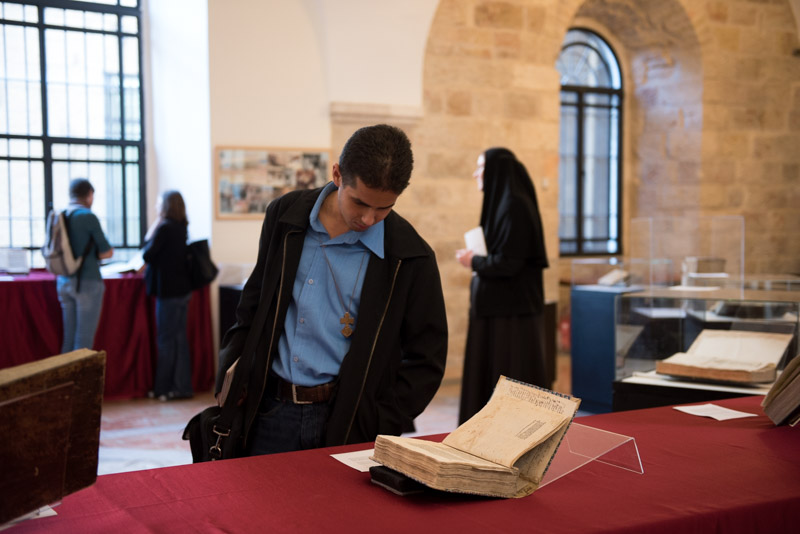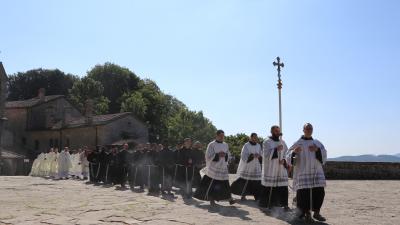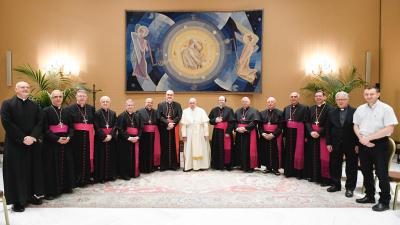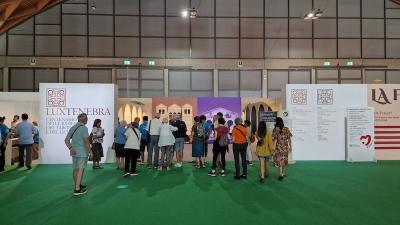
New initiatives by the libraries of the Custody of the Holy Land are being made for the development of its library heritage and to help encourage dialogue. From November 8 to 10, an exhibition of fifteenth-century books was hosted at the courtyard of the Custody's Curia; on November 9, a convention was held with exceptional speakers from various cultural backgrounds. All of these events are part of “Books as bridges of peace,” a project that began in 2011, thanks to the collaboration between the Custody of the Holy Land, the European Research Center Book Publishing Library (CRELEB), the Catholic University of Milan and the Pro Terra Sancta Association (ATS).
The twenty-six incunabula—that were exhibited at Ars artificialiter scribendi. an exhibition of fifteenth-century books of the Franciscan Custody of the Holy Land—come from Rhodes, Cairo, Cyprus, Nazareth, Beirut, Bethlehem and Washington. “The exhibit's objective,” explained Prof. Edoardo Barbieri, director of the CRELEB, “the promotion of the Custody's ancient library heritage as an opportunity for scholars from different cultural traditions on the topic to meet.” The catalog of the exhibit, Ars artificialiter scribendi, written by Luca Rivals and Lorenzo Salamone, includes a preface by Eisermann Falk, director of the Gesamtkatalog der Wiegendrucke in Berlin. “I started working on a catalog of sixteen-century incunabula in 2011,” said Luke Rivals, “and it will be published in 2017. For the exhibit, a shorter catalog was put out, with some general information and explanations.”
Fr. Lionel Goh, general librarian of the Custody, described the exhibition as a “very precious opportunity” because without a catalog, you cannot even know the treasure that you have. “When we discover things that concern the Jews and the Arabs, new roads can be opened to dialogue, and we understand that we share the same history,” added Fr. Lionel. Otherwise, the library would become a book cemetery, whereas under my guidance, I am trying to open it up to the world and give it life.” This is the very reason, that the conference on November 9 was organized with the title “Cataloging in order to preserve and learn: an international journey through the ancient books of Jerusalem.” At the Custody of the Holy Land, some of the top experts in the field of Arab, Jewish and Armenian culture gathered together.
After the greetings by the General Consul of Italy, Fabio Sokolowitz, and the Consul General of Spain, Rafael Matos, Fr. Dobromir, the Vicar of the Custody of the Holy Land, gave his welcome speech. For the occasion, the Italian Minister of Education, Stefania Giannini, sent her own message, which was read by Prof. Barbieri. “The knowledge of the book and the prospects of its enhancement” was the theme of the lecture that opened the conference. It should have been led by Luisa López-Vidriero Abelló, the director of the Royal Library in Madrid, but not being able to get to Jerusalem, she asked Dr. Sissi Mattiazzo to deliver he speech for her. Afterwards, a Q&A was held via Skype call from Spain. After a coffee break, Yoel Finkelman, from Israel's the National Library, spoke about the preservation of Hebrew manuscripts, followed by George Hintlian, who specifically discussed Armenian documents. Luca Rivali talked about his experience cataloging the incunabula for the Franciscan libraries, while Khader Salameh focused on the Arabic manuscripts in the Jerusalem libraries.
How can the collaboration between the various realities present in Jerusalem be carried out? “We need a catalog of all of the manuscripts in Jerusalem and then we must get the funds to restore them,” said Khader Salameh. “We could share a digitization project, cultural events and educational activities,” said Yoel Finkelman. George Hintlian added, “We have a very superficial idea about each library. The first thing to do is to encourage the desire to physically visit the other collections. Today we are beginning to build a bridge.”
Beatrice Guarrera




